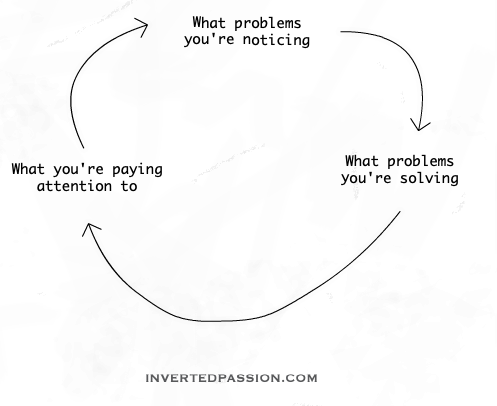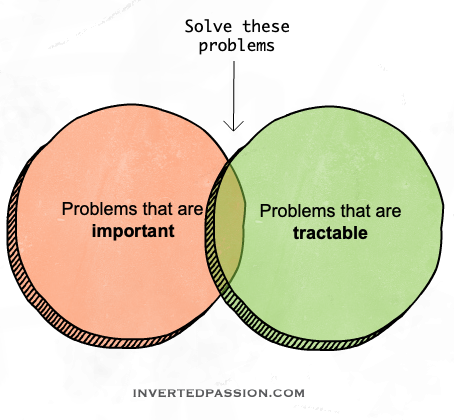[Inverted Passion] Solve the most important problem that you can personally impact
|
Older messages
[Inverted Passion] [Podcast #10] We should explore new ways of funding science
Tuesday, May 18, 2021
Here's a new post on InvertedPassion.com [Podcast #10] We should explore new ways of funding science By Paras Chopra on Mar 31, 2021 03:05 am The way science is funded today is broken. Writing
[Inverted Passion] All startups belong to an ecosystem that makes or breaks them
Tuesday, May 18, 2021
Here's a new post on InvertedPassion.com All startups belong to an ecosystem that makes or breaks them By Paras Chopra on Apr 04, 2021 01:52 am All startups live in an ecosystem where different
[Inverted Passion] Crypto is the future of our society
Tuesday, May 18, 2021
Here's a new post on InvertedPassion.com Crypto is the future of our society By Paras Chopra on Apr 12, 2021 02:34 am Balaji is a deep thinker on crypto and its implications. Formerly the CTO of
[Inverted Passion] My moral code
Tuesday, May 18, 2021
Here's a new post on InvertedPassion.com My moral code By Paras Chopra on Apr 18, 2021 01:59 am Lately, I've been feeling a lack of a well-deliberated, explicit moral code. The world is
[Inverted Passion] Find partners who can grow their business by building on top of your business
Tuesday, May 18, 2021
Here's a new post on InvertedPassion.com Find partners who can grow their business by building on top of your business By Paras Chopra on Apr 24, 2021 02:31 am No business delivers value to the end
You Might Also Like
📂 [Free database] Everything to delegate to a Marketing VA
Thursday, March 6, 2025
Free resource: What to delegate to a Marketing VA without the guesswork. ͏ ͏ ͏ ͏ ͏ ͏ ͏ ͏ ͏ ͏ ͏ ͏ ͏ ͏ ͏ ͏ ͏ ͏ ͏ ͏ ͏ ͏ ͏ ͏ ͏ ͏ ͏ ͏ ͏ ͏ ͏ ͏ ͏ ͏ ͏ ͏ ͏ ͏ ͏ ͏ ͏ ͏ ͏ ͏ ͏ ͏ ͏ ͏ ͏ ͏ ͏ ͏ ͏ ͏ ͏ ͏ ͏ ͏ ͏ ͏ ͏ ͏ ͏ ͏
this is today
Thursday, March 6, 2025
join me: The Future of the Customer Journey Hi there, Laura here, Principal Analyst at CB Insights. I wanted to personally invite you to today's session on how generative AI is reshaping the
[SaaS Club] The Magic of Narrowing Your Target Market
Thursday, March 6, 2025
The SaaS Club Newsletter ⚡️ Presented by Designli Hey Reader Here's a quick round up of what's been going on at SaaS Club: In this week's newsletter: 🎧 From legal nightmare to focused 7-
How we review startups
Thursday, March 6, 2025
Our checklist for vetting startups before they go live on Microns. ͏ ͏ ͏ ͏ ͏ ͏ ͏ ͏ ͏ ͏ ͏ ͏ ͏ ͏ ͏ ͏ ͏ ͏ ͏ ͏ ͏ ͏ ͏ ͏ ͏ ͏ ͏ ͏ ͏ ͏ ͏ ͏ ͏ ͏ ͏ ͏ ͏ ͏ ͏ ͏ ͏ ͏ ͏ ͏ ͏ ͏ ͏ ͏ ͏ ͏ ͏ ͏ ͏ ͏ ͏ ͏ ͏ ͏ ͏ ͏ ͏ ͏ ͏ ͏ ͏ ͏ ͏
Growth Newsletter #243
Thursday, March 6, 2025
Get F*cking Going ͏ ͏ ͏ ͏ ͏ ͏ ͏ ͏ ͏ ͏ ͏ ͏ ͏ ͏ ͏ ͏ ͏ ͏ ͏ ͏ ͏ ͏ ͏ ͏ ͏ ͏ ͏ ͏ ͏ ͏ ͏ ͏ ͏ ͏ ͏ ͏ ͏ ͏ ͏ ͏ ͏ ͏ ͏ ͏ ͏ ͏ ͏ ͏ ͏ ͏ ͏ ͏ ͏ ͏ ͏ ͏ ͏ ͏ ͏ ͏ ͏ ͏ ͏ ͏ ͏ ͏ ͏ ͏ ͏ ͏ ͏ ͏ ͏ ͏ ͏ ͏ ͏ ͏ ͏ ͏ ͏ ͏ ͏ ͏ ͏ ͏ ͏ ͏ ͏ ͏ ͏ ͏
Notion’s lost years, its near collapse during Covid, staying small to move fast, the joy and suffering of building…
Thursday, March 6, 2025
Listen now (72 mins) | Ivan Zhao (co-founder and CEO of Notion) reveals how a lean team, a passionate community, and a contrarian building product approach turned Notion into one of the most beloved
☠️ This outdated ecommerce model is dead
Thursday, March 6, 2025
If you want real success, you need to create a microbrand with a unique product that stands out. Hey Friend , Ecommerce is exploding. Worldwide online sales are expected to hit $6 trillion this year.
Yann LeCun joins buzzy AI startup
Thursday, March 6, 2025
+ how to build a board of directors View in browser Powered by ViennaUP by Tom Nugent Good morning there, Some of Europe's buzziest AI startups are in a bind. As Kai Nicol-Schwarz reports today,
[VIDEO] From $4000 to a $14B empire: The Ray Dalio Episode
Wednesday, March 5, 2025
Hard-won lessons on success, decision-making, and overcoming setbacks. design-2-header-newsletter Hi there, We're thrilled to bring you the latest episode of the Foundr Podcast featuring Ray Dalio,
The Major Forces Transforming Commerce
Wednesday, March 5, 2025
The catalysts & shifts catalyzing new opportunities and changes across the ecosystem ͏ ͏ ͏ ͏ ͏ ͏ ͏ ͏ ͏ ͏ ͏ ͏ ͏ ͏ ͏ ͏ ͏ ͏ ͏ ͏ ͏ ͏ ͏ ͏ ͏ ͏ ͏ ͏ ͏ ͏ ͏ ͏ ͏ ͏ ͏ ͏ ͏ ͏ ͏ ͏ ͏ ͏ ͏ ͏ ͏ ͏ ͏ ͏ ͏ ͏ ͏ ͏ ͏ ͏ ͏ ͏


